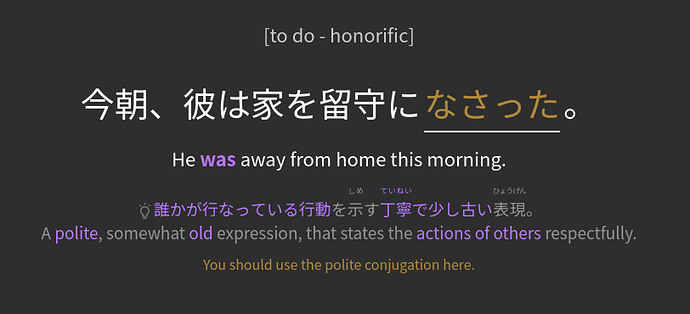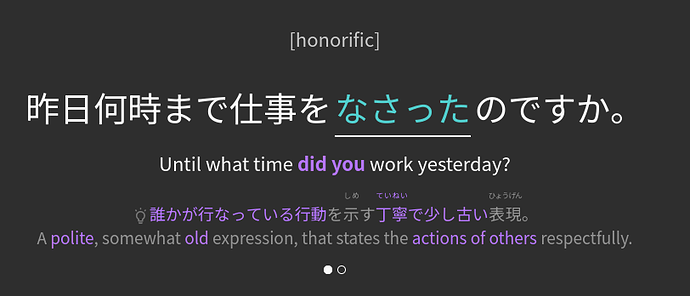Thanks for taking the time to give such a clear and thorough explanation - I understand it a lot better now!
I am really glad! 
I was scared I wrote it in a confusing way 
I still don’t understand why “the short form has to precede the ん・のです”
When did we learn that なさっていた is the short form and that it must precede the んです?
is なさっていたんです grammatically wrong?
なさっていたんです is grammatically correct, なさっていました is also grammatically correct.
The short form is another name for the plain form, opposed to long form - polite form。
Short form: 行く、来る、食べる、なさる、なさっている、なさっていた
Long form: 行きます、来ます、食べます、なさいました、なさっています、なさっていました
As a rule of thumb, the politeness (with some exceptions like が、けれども and sometimes けど、から、ので) is marked only at the end of sentence. So if it is already marked in the end, you don’t have to use the polite form in other clauses in this sentence.
子供のころスポーツをなさっていたんですね。Good
No need to use another polite form in this sentence, since politeness is already marked by んです。
(子供のころスポーツをなさっていましたんですね。No need for なさっていました )
But there are exceptions, like が:
難しいですが、頑張ります。Good
Even though 頑張ります is used, the phrase before が also has to be in polite form.
難しいが、頑張ります。 Not good.
You are right, it has to be mentioned! 
I hope it helps! Feel free to ask more! 
Cheers!
What is the purpose of the casual conjugations when using honorific language?
It seems strange. I tried using a casual conjugation on honorific language on another grammar point, and it was considered sub-optimal for that very reason. So I am just wondering what possible situation it is suitable?
Hey 
Very or more like, EXTREMELY good question!
First of all, the “casual form” might be a bit misleading. Let’s think of it as a “short form”.
You can use it when for example you talk about a person you want to exalt, but you talk with your friend (ます expresses politeness to a person you are talking)
友達に教師について:「先生はどうなさったの?」
Another case would be when the honorific expression modifies a noun.
武先生は、田中さんと手紙のやりとりをなさったことがおありですか?
etc
I hope it helps, 
Cheers
@mrnoone this is a great way of explaining. I was trying to think of a way to answer this question yesterday but couldn’t think of a clear way to put it so I decided against posting.
You do hear this fairly often in the office so it’s fair to say that it’s pretty common to use the dictionary form.
Sorry to add to an already extensive thread, but I can’t find anywhere that says んです is a…politeness indicator, for lack of a better term. Or is it purely due to the choice of です over だ?
I’m currently going through Genki 2 (2nd ed) and I’m a bit confused about する/なさる + ている.
With ている, the grammar in Genki 2 has examples
a) for special honorific verbs as [honorific verb]ている, e.g. ご覧になっています, and
b) for verbs lacking a special honorific as [verb]ていらっしゃいます, e.g. 話していらっしゃいます.
After that, I’d expect している to become なさっている, but the following exercise (chapter 19, exercise 1C) has two cases where it conjugates to していらっしゃる:
- 結婚していますか becomes 結婚していらっしゃいますか
- 勉強していますか becomes 勉強していらっしゃいますか
Would なさっていますか be valid? Are they both valid? Is there any difference?
edit: I tasked my tutor, and while she has no idea why Genki uses one over the other, she considers both forms as sounding natural.
Stupid question probably, but why is nasaru acceptable but ninaru is not?
Check out the Details Information writeup under なさる to get more details. (They’re basically the same.) However, if you use になる, you need the honorific お in front of the verb, so when doing the reviews, only one answer will make sense. 
Ah, そうです。なるほど。I had seen the お at the beginning of the sentence and assumed it was part of the honorific. Thank you!
I have a question about this sentence:
私はそんなに上手じゃないので、期待なさらないでください
How come the correct answer is なさるhere and not いたす? I thought なさる wasn’t supposed to be used when talking about yourself?
Thanks!
Hi there, and thanks for getting in touch. For this sentence, 期待 means to have expectations. So the speaker is asking the person they are talking to not to have expectations. In this way, the person performing the action of ‘not expecting anything’, or ‘not getting their hopes up’ is the listener, not the speaker.
Hope this clears it up  .
.
Quick edit - Just to be even clearer, it doesnt matter if the sentence is ‘about’ the speaker. The only thing that controls which honorific to use is the person that is doing any specific action within that sentence.
I think that makes sense… Thanks for the prompt reply!
I keep tripping over this… why is あの人を信用なさっていますか using なさっています - why can’t I say なさりますか?
You generally can’t say that, because the polite form of なさる is なさいます.
If you try that, instead of an error, you get a hint that it wants you to say “trusting”.
Why do I have to use the polite form in one review but not in the other? What is the indication in those two example sentences?
Edit:
After backreading a second time, is it because the second one is already polite because of the のです ?

Why can’t いらっしゃいました be accepted here? It seems it would fit as a description of a state (in this case, being away)?
It’s phrased as 家を留守にする, maybe closer to “leave the house unattended” in English. いる etc. don’t fit.


